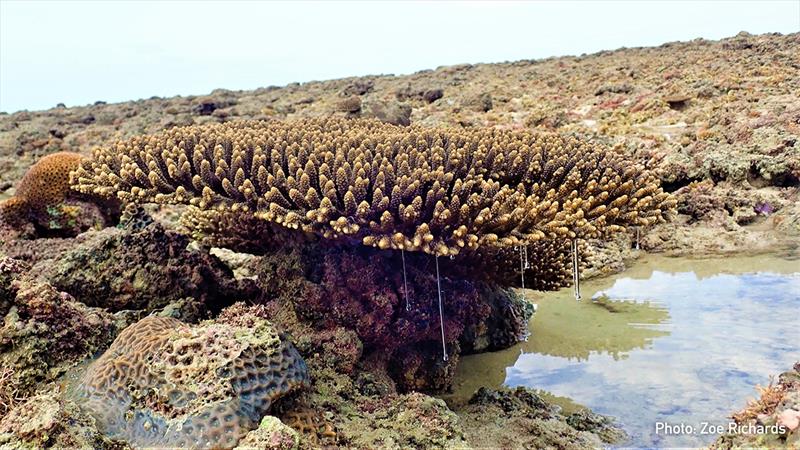
DNA reveals the past and future of coral reefs
by ARC Centre of Excellence for Coral Reef Studies 22 Oct 2022 04:54 UTC

Protective mucous dripping of a coral colony exposed at low tide Beagle Reef © Zoe Richards
New DNA techniques are being used to understand how coral reacted to the end of the last ice age in order to better predict how they will cope with current changes to the climate.
James Cook University's Dr Ira Cooke was senior author of the study. He said when corals become stressed they often bleach and die, but not all corals experience stress equally.
"This is often due to genetic differences between species, but it's usually very difficult to determine which genes are responsible. In situations where the differences evolved relatively recently - thousands not millions of years ago - it's much easier to do so," said Dr Cooke.
He said the end of the last ice age is relatively recent in evolutionary terms and it sometimes forced corals to adapt to stresses similar to those projected under future climate change.
"Until now it hasn't been possible to look at this period in coral evolution because most of the techniques available have provided information about much older events. But by sequencing the whole genomes of many individuals within a single species we have now been able to access this crucial period of coral evolutionary history," said Dr Cooke.
JCU PhD candidate Jia Zhang, lead author of the study, said sea-level change has reshaped the Kimberley coral communities many times in the past.
"This study examines how these historical changes have influenced coral population sizes, how far they disperse, and their ability to adapt," said Ms Zhang.
She said the researchers compared the genomes of corals from the inshore Kimberley with those inhabiting more benign offshore locations (Ashmore Reef and Rowley Shoals).
"We found there were clear genetic distinctions, akin to races, between corals from the three locations we studied but most obviously between the inshore and offshore reefs, and that these genetic groups had arisen around the time the last ice-age ended.
"This was when sea levels rose dramatically allowing corals to colonise the Kimberley region, and to re-establish themselves on the tops of offshore atolls," said Ms Zhang.
Co-author of the study, Dr Zoe Richards from Curtin University's School of Molecular and Life Sciences said as the sea-level rose between 20 and 10 thousand years ago, corals dispersed to new habitats.
"But only those individuals with the right genetic makeup were able to survive. This selective process is visible in the genomes and tells us which genes were important for survival," said Dr Richards.
She said corals from the Kimberley had tell-tale patterns in their genomes revealing genes that were modified through natural selection around the time of the last ice-age when they colonised this tough inshore habitat.
Dr Cooke said one specific type of genes called peroxinectins have been under especially strong and recent evolutionary pressure (natural selection) in inshore Kimberley corals.
"These genes clearly evolved different versions in inshore corals and it's likely that this helps them cope with the extreme environmental conditions there. These genes provide a roadmap to help further understand how corals can survive turbid, hot and exposed conditions like those in the Kimberley"
This study was funded by ARC Linkage Project LP160101508.
Paper
Zhang J, Richards Z, Adam A, Cheong XC, Shinzato C, Gilmour J, Thomas L, Strugnell J, Miller D, Cooke I. 2022. 'Evolutionary responses of a reef-building coral to climate change at the end of the last glacial maximum'. Molecular Biology and Evolution. DOI: doi.org/10.1093/molbev/msac201